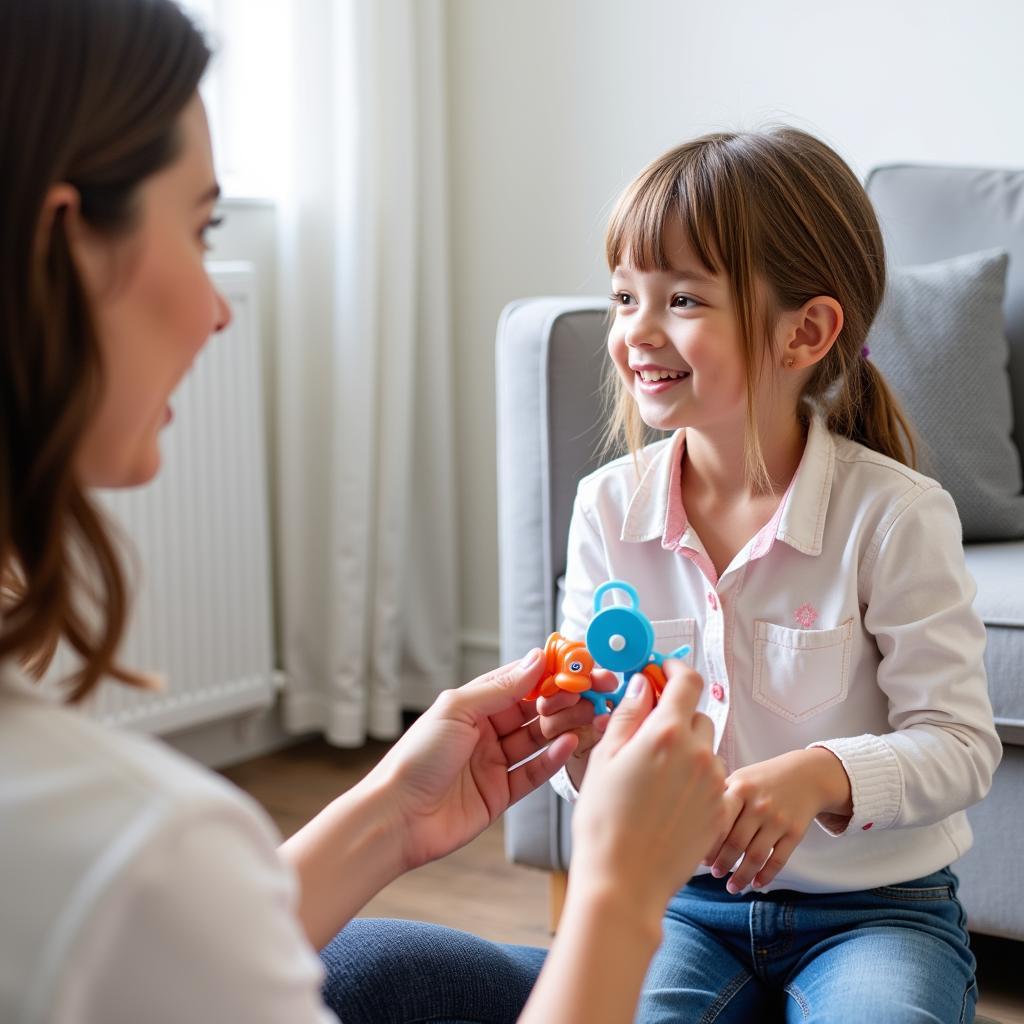Hospital Toys are a fascinating category, bridging the gap between play and the often-daunting world of healthcare. These toys can range from simple doctor playsets to intricate models of medical equipment, offering children a chance to familiarize themselves with medical settings, process anxieties, and even learn about caring for others. We’ll explore the diverse world of hospital toys, their benefits, and how they can contribute to a child’s development. Check out our animal hospital toy with keys.
The Benefits of Play in a Medical Context
Hospital toys can be more than just fun and games; they can be powerful tools for helping children cope with medical experiences. For children facing illness or hospitalization, these toys can offer a sense of control and normalcy in an unfamiliar and sometimes frightening environment. Playing with hospital toys allows children to act out procedures they might be undergoing, reducing anxiety and promoting understanding.
Playing “doctor” with a toy hospital set empowers children to take on the role of the caregiver. This can be particularly helpful for children who are feeling powerless or vulnerable due to their own medical experiences. By acting out scenarios, they can process complex emotions and gain a sense of mastery over the situation.
Different Types of Hospital Toys
The range of hospital toys available is vast and caters to various age groups and interests. Simple toy doctor kits with stethoscopes, bandages, and syringes are popular choices, providing a basic introduction to medical tools. More elaborate sets include miniature operating rooms, ambulances, and even X-ray machines. Some toy hospitals focus on specific areas like dentistry or veterinary care, allowing children to explore different medical professions. Don’t miss our collection of animal hospital toys.
For younger children, plush toys shaped like doctors, nurses, or patients can offer comfort and familiarity. These soft toys can become cherished companions, especially during times of stress or uncertainty. Older children may be drawn to more realistic models of medical equipment, allowing them to engage in more complex pretend play scenarios.
Choosing the Right Hospital Toy
Selecting an appropriate hospital toy depends on the child’s age, interests, and specific needs. For a child facing an upcoming surgery, a toy operating room might help them understand and process the procedure. A child fascinated by animals might enjoy an animal hospital toy with keys. For a child dealing with the illness of a loved one, a doll or plush toy could provide comfort and a sense of connection.
The Educational Value of Hospital Toys
Beyond their therapeutic benefits, hospital toys can also be valuable educational tools. They can introduce children to basic medical concepts, such as the importance of hygiene, the different roles within a hospital, and the functions of various medical instruments. This early exposure can spark an interest in science and healthcare, potentially inspiring future career paths.
Some hospital toys even incorporate interactive elements, such as lights, sounds, and moving parts, further enhancing their educational value. These features can make learning about the human body and medical procedures more engaging and memorable for children. You might also enjoy a fisher price hospital vintage.
Beyond Play: Using Hospital Toys in Therapy
Dr. Amelia Hernandez, a child psychologist specializing in play therapy, emphasizes the importance of hospital toys: “These toys are incredibly valuable tools for helping children express their feelings and cope with challenging medical experiences. They provide a safe and non-threatening way for children to process their anxieties and gain a sense of control.”
 Child and Therapist Using Hospital Toys
Child and Therapist Using Hospital Toys
Hospital toys can facilitate communication between children and their caregivers, providing a shared language for discussing medical issues. They can also be used by therapists to assess a child’s understanding of their medical situation and address any misconceptions or fears. Another helpful resource might be a doc mcstuffins toy hospital dvd.
Conclusion: The Power of Hospital Toys
Hospital toys are more than just playthings. They are powerful tools that can help children cope with medical experiences, learn about healthcare, and even spark an interest in science. Whether it’s a simple doctor kit or an elaborate toy hospital, these toys offer a unique opportunity to bridge the gap between play and the world of medicine. Check out our selection of toy hospital set.
FAQ
- What are the benefits of hospital toys? Hospital toys can reduce anxiety, promote understanding of medical procedures, and offer a sense of control in a challenging situation.
- How can I choose the right hospital toy for my child? Consider the child’s age, interests, and specific medical situation.
- Are there educational hospital toys available? Yes, many hospital toys introduce basic medical concepts and can spark an interest in science.
- Can hospital toys be used in therapy? Yes, therapists often use hospital toys to help children express their feelings and cope with medical anxieties.
- Where can I find a good selection of hospital toys? Toy stores, online retailers, and specialty medical supply stores often carry a variety of hospital toys.
- What age group are hospital toys suitable for? Hospital toys are available for a wide range of ages, from toddlers to older children.
- Are there hospital toys designed for specific medical conditions? Yes, some toys are designed to help children understand and cope with specific procedures or illnesses.
Other helpful articles
- Caring for your child during a hospital stay
- Preparing your child for surgery
- Talking to your child about illness
When you need support, please contact Phone Number: 02437655121, Email: [email protected] Or visit us at: 298 Cau Dien Street, Minh Khai, Bac Tu Liem, Hanoi, Vietnam. We have a 24/7 customer service team.